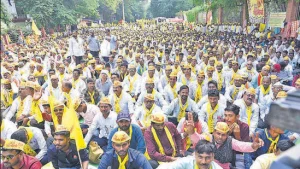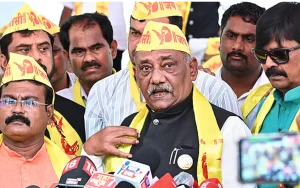Nagpur, Maharashtra – Thousands of members from the Other Backward Classes community organized a massive OBC protest Nagpur Kunbi demonstration on Friday, demanding the immediate withdrawal of a controversial Government Resolution issued on September 2 that grants Kunbi status to eligible Marathas. The protesters issued stern warnings that failure to scrap the GR would result in the OBC community blocking major cities including Mumbai, Pune, and Thane.
Large-Scale Mobilization Against Government Resolution

The OBC protest Nagpur Kunbi rally was organized under the banner of the Sakal OBC Maha Morcha and witnessed unprecedented participation from the community. The protest march commenced at Yeshwant Stadium and covered three kilometers before culminating at Samvidhan Square in Nagpur’s bustling Civil Lines area. Participants carried placards and chanted slogans opposing the September 2 GR, which permits Marathas who can prove their Kunbi lineage to claim OBC status.
The demonstrators argued that issuing Kunbi caste certificates to eligible Marathas would unfairly dilute the existing OBC reservation benefits, threatening the constitutional safeguards that protect their quota rights.
Congress Leader Accuses Government of Pressure Politics


Addressing the massive gathering during the OBC protest Nagpur Kunbi rally, Congress MLA and former leader of the opposition in the state assembly, Vijay Wadettiwar, accused the Devendra Fadnavis government of succumbing to pressure from Maratha quota activist Manoj Jarange-Patil. “The government issued this GR to finish the OBCs in Maharashtra,” Wadettiwar alleged, warning of severe consequences if the decision is not revoked.
Wadettiwar drew parallels to Jarange-Patil’s tactics, stating: “When Jarange-Patil could choke the traffic of Mumbai demanding inclusion of Marathas into Kunbis, we will jam the whole of Mumbai, along with Pune and Thane, to show our strength.”
“Black GR” Threatens OBC Rights
During the OBC protest Nagpur Kunbi demonstration, Wadettiwar characterized the September 2 notification as a “black GR,” describing it as a calculated move to weaken OBC rights. “We will uproot it completely through unity and determination,” he declared, adding that the state government was “putting a hammer on the necks of OBCs” and must either protect their rights or face the consequences.
The Congress leader’s strong rhetoric reflected the deep-seated concerns within the OBC community about the potential erosion of their reservation benefits.
Prominent Leaders Join Movement
The OBC protest Nagpur Kunbi rally saw participation from several prominent community leaders and political figures. The Sakal OBC Sanghatana, an umbrella organization representing various OBC castes, led the march with support from former home minister Anil Deshmukh, ex-minister Sunil Kedar, Chandrapur MP Pratibha Dhanorkar, and activists Laxman Hake and Mahadev Jankar.
Protesters raised slogans such as “Ek Mission – OBC arakshan (One mission – OBC reservation),” asserting that the state government’s decision violates constitutional safeguards protecting their reservation quota.
Community Clarifies Position on Maratha Relations

Organizers of the OBC protest Nagpur Kunbi rally emphasized that their opposition was not directed against the Maratha community itself. “We are not against our Maratha brothers,” one speaker clarified, “but inclusion under the OBC category cannot come at the cost of existing communities’ share.” The organizers reiterated their commitment to continue state-wide protests until the GR is withdrawn.
Also Read: Shocking Porsche Crash Mumbai: Luxury Car Destroyed in Highway Race
Historical Context of the Controversial GR
The Maharashtra government issued the September 2 GR following persistent protests by Maratha quota activist Manoj Jarange-Patil, who had conducted a five-day sit-in agitation at Mumbai’s Azad Maidan. The order allows Marathas who can prove their Kunbi ancestry through historical records to receive Kunbi caste certificates.
The OBC protest Nagpur Kunbi opposition stems from concerns that the GR provides for the use of the 1918 Hyderabad gazetteer, which documented Marathas as Kunbis during the Nizam’s rule, to establish eligibility. OBC organizations fear this move will erode their quota share and intensify competition for limited opportunities.
Notable Absence of Ruling Party Representatives
A significant aspect of the OBC protest Nagpur Kunbi rally was the complete absence of legislators or representatives from the ruling coalition parties—Bharatiya Janata Party, Shiv Sena, and Nationalist Congress Party. The absence of prominent pro-OBC leaders such as Chhagan Bhujbal, Dhananjay Munde, and OBC Mahasangh president Babanrao Tayawade was particularly noteworthy.
Government Response and Clarifications
Revenue minister Chandrashekhar Bawankule had appealed to organizers to cancel the OBC protest Nagpur Kunbi event, citing distress among farmers due to incessant rains. However, the Sakal OBC Sanghatna proceeded with the rally, which saw large participation from the Vidarbha region and various districts across the state.
Bawankule, himself belonging to the OBC community, termed the rally a planned conspiracy against the state government and an attempt to mislead OBCs. He clarified that “the September 2 Government Resolution applies solely to the Marathwada region.”
Assurances from Chief Minister
Bawankule revealed that during a recent meeting between OBC representatives led by Wadettiwar and Chief Minister Fadnavis, assurances were provided that the GR would not be misused and Kunbi certificates would be issued only to genuinely eligible individuals.
Activist Dismisses Protest as Political
Responding to the OBC protest Nagpur Kunbi demonstration, Jarange-Patil dismissed it as politically motivated. “Wadettiwar is trying to finish the Congress by organising such anti-people protests. There is no need to give importance to him,” he stated.
The ongoing controversy highlights the complex dynamics of reservation politics in Maharashtra, with the OBC protest Nagpur Kunbi rally representing a significant escalation in community mobilization against the government’s decision.

